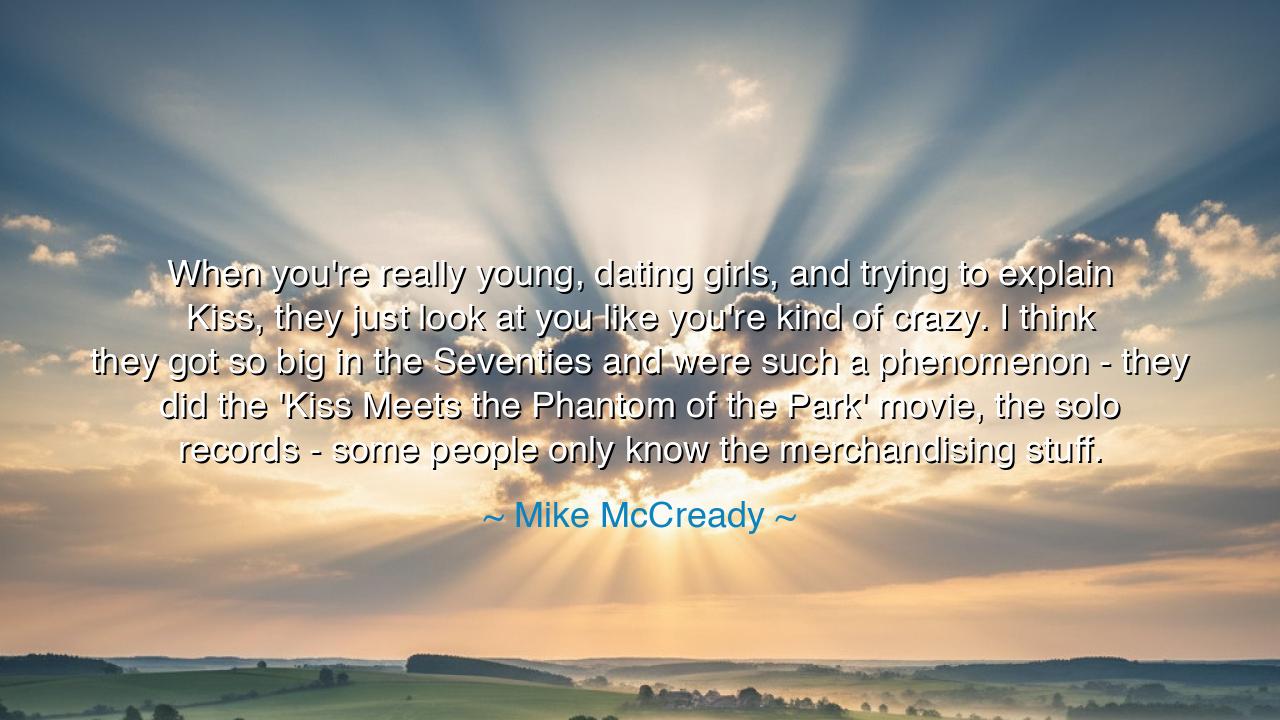
When you're really young, dating girls, and trying to explain
When you're really young, dating girls, and trying to explain Kiss, they just look at you like you're kind of crazy. I think they got so big in the Seventies and were such a phenomenon - they did the 'Kiss Meets the Phantom of the Park' movie, the solo records - some people only know the merchandising stuff.






In the chronicles of youth and thunder, a guitarist speaks with a half-smile and a wince: “When you’re really young, dating girls, and trying to explain Kiss, they just look at you like you’re kind of crazy. I think they got so big in the Seventies and were such a phenomenon—they did the 'Kiss Meets the Phantom of the Park' movie, the solo records—some people only know the merchandising stuff.” So says Mike McCready, and his words are a parable of zeal misunderstood, of devotion lost beneath glitter. He names a truth older than stadiums: that the fire at the center of a tribe is often mistaken for smoke by those who stand outside the circle.
Hear the meaning under the jest. The awkwardness of dating while professing allegiance to a band like Kiss is the friction of two liturgies: one of romance seeking the tender, and one of rock seeking the colossal. To the uninitiated, the painted faces and pyrotechnics seem like costume without creed. Yet for the faithful, the spectacle is sacrament: the roar of amps as absolution, the communal chant as belonging. McCready’s line teaches that passion has dialects, and some—loud as cannons—are illegible to the quiet heart across the table.
He points, too, to the origin of the misunderstanding: the sheer scale of the Seventies ascent. Kiss became a phenomenon so vast that artifacts eclipsed art—lunchboxes, action figures, comic books printed in their own blood, the TV spectacle of “Kiss Meets the Phantom of the Park”, four solo records issued as a single constellation. The machine of fame—bright, efficient, relentless—wrapped the music in a carnival so complete that later generations sometimes met the carnival first and never reached the song. Thus the lover of sound must first unstack the merchandise to show the pulse that made the posters breathe.
Let a story walk beside the quote. A boy in denim brings a vinyl copy of Alive! to a girl who prefers dusk-toned folk songs. He fumbles the explanation—why the fire-breathing matters, why the drum solo is the heart’s own thunder. She sees only masks and marketing; he hears only the rite that made a lonely room feel like a city. Years later, they meet again, older, gentler. He plays the same record at low volume, and she hears what youth hid: the swing inside the stomp, the blues beneath the chrome. She smiles. “I still don’t need the posters,” she says, “but I hear the joy.” The lesson is not that one must convert to the other’s temple, but that time and patience can reveal the human face behind the paint.
History hums with similar tales. Elvis was once dismissed as a pelvic trick, The Beatles as haircut hysteria, punk as safety-pin pantomime. Each movement carried costumes and commerce that made easy targets for those unwilling to listen past the edge. Yet beneath every banner lay craft: chord choices, rhythmic cunning, a labor of arranging that merchandise cannot counterfeit. McCready’s wisdom is to admit the gaudy scaffolding without surrendering the cathedral it held up.
So what should the apprentice of culture learn? First, do not confuse the wrapper with the bread. Merchandising may be a loud herald, but it cannot sing harmony or keep time; the song must be tested in the ear and the spine. Second, let curiosity outrun embarrassment. If your beloved loves something you do not fathom, ask for the door into it—the one song, one performance, one story where the flame first touched them. Third, carry tenderness into every translation: the kid defending Kiss is often defending his own escape hatch from loneliness.
Take these practices as provisions. When you meet a phenomenon, peel back its layers with kindness: one listen with eyes closed, one read of its history, one watch of a live cut stripped of spectacle. When you share your passion, lead not with merchandising or legend, but with the simplest track where the band is just four humans in a room. And when you sit across from someone who cannot yet hear it, keep your ardor but loosen your pride; love needs no conversion to be understood. Do this, and you will find what McCready’s memory holds: that beyond the masks and the movie reels, there is a beating center, and that respect—like good tone—travels farther than volume.
In the end, the quote is a lantern for every age of fandom. It laughs at youthful zeal without shaming it, and it warns that bigness can blur meaning. But it also invites a braver listening: past the Seventies billboards and the solo records, through the thunder and smoke, into the workshop where musicians sweat over parts until they lock. There, even a skeptic can nod: the song was first; the spectacle came later. And across a table on a first date—or a last—you may both smile at the strangeness of our devotions, and keep talking long enough to hear the music in each other.






AAdministratorAdministrator
Welcome, honored guests. Please leave a comment, we will respond soon